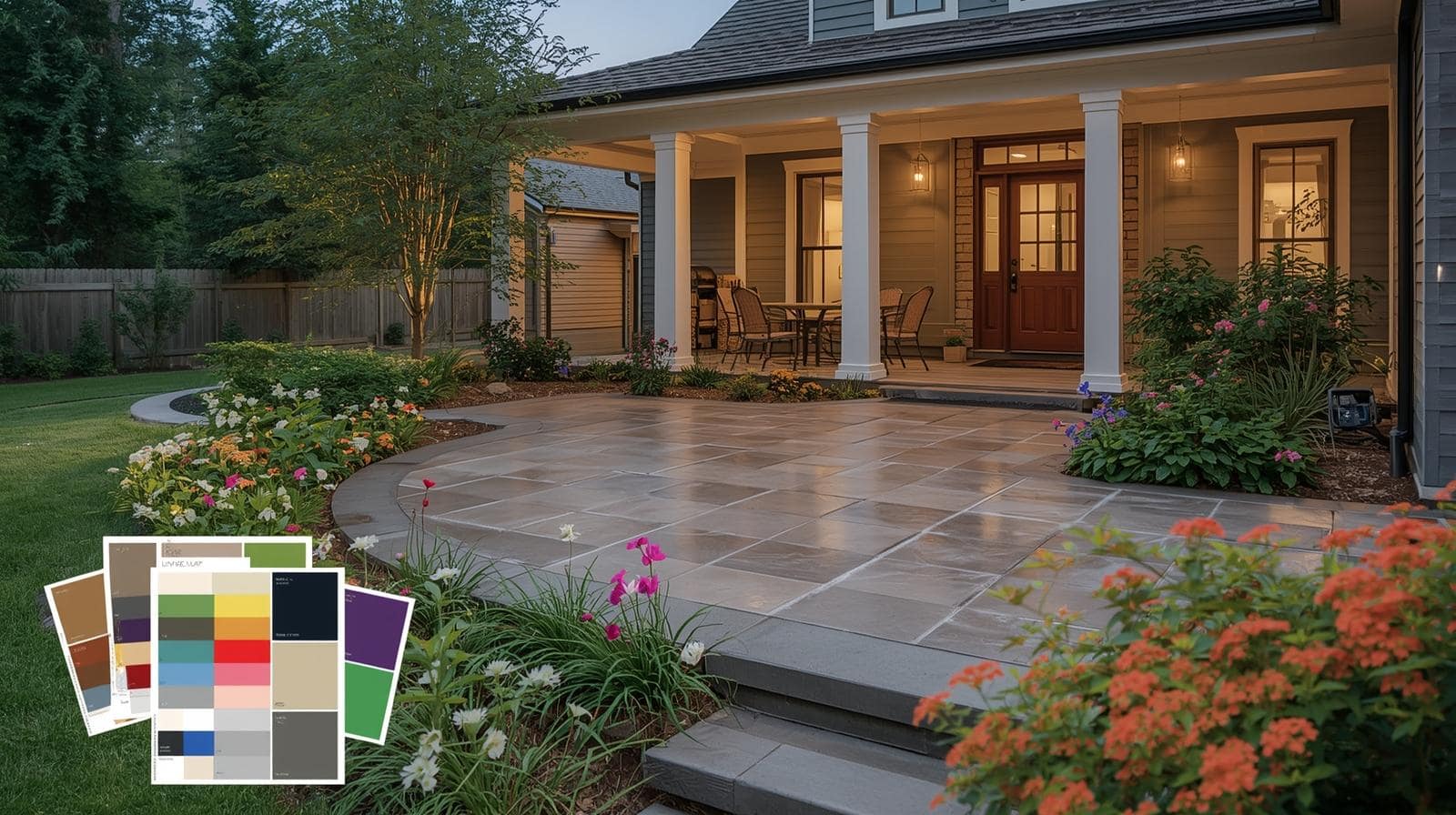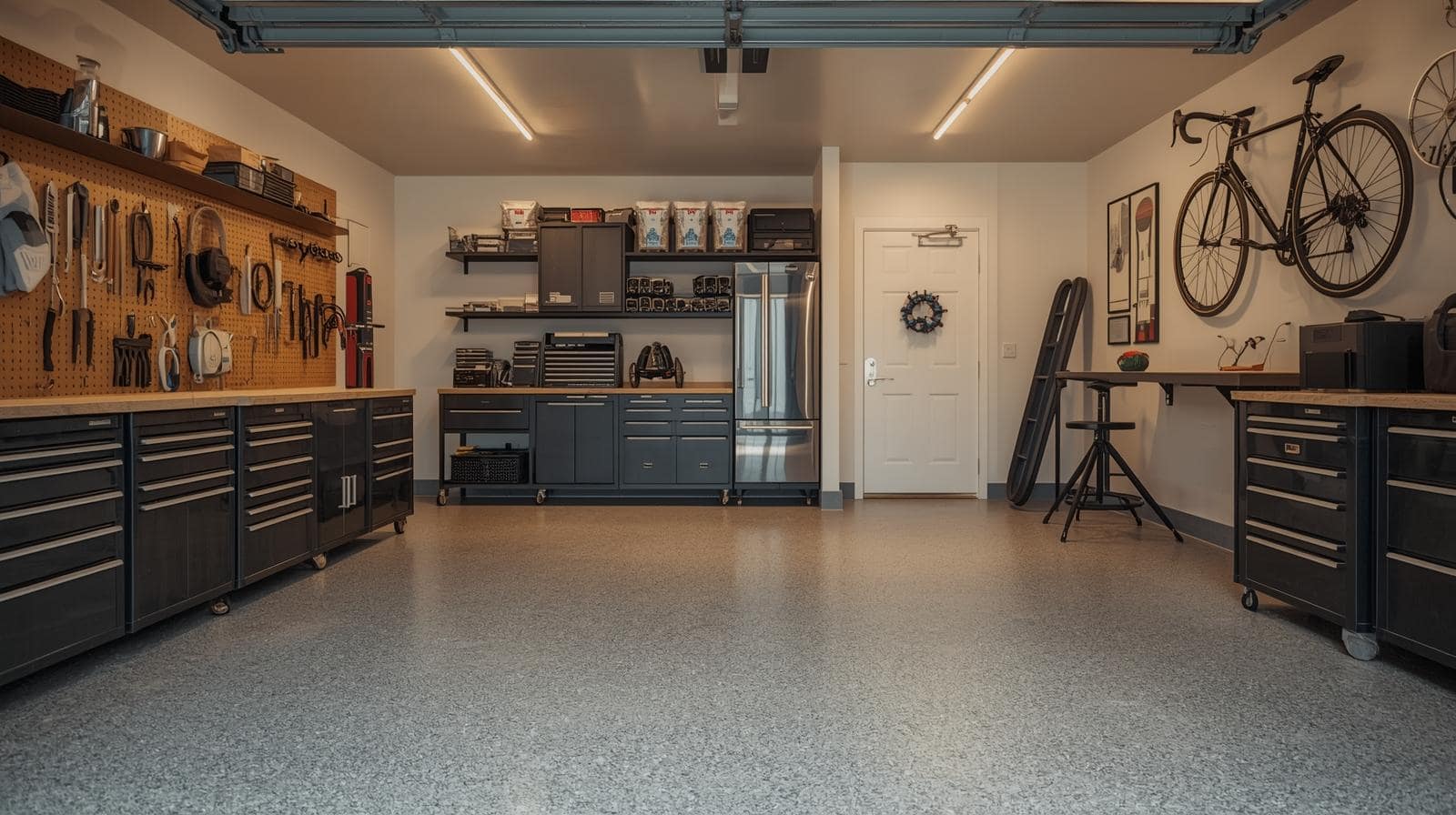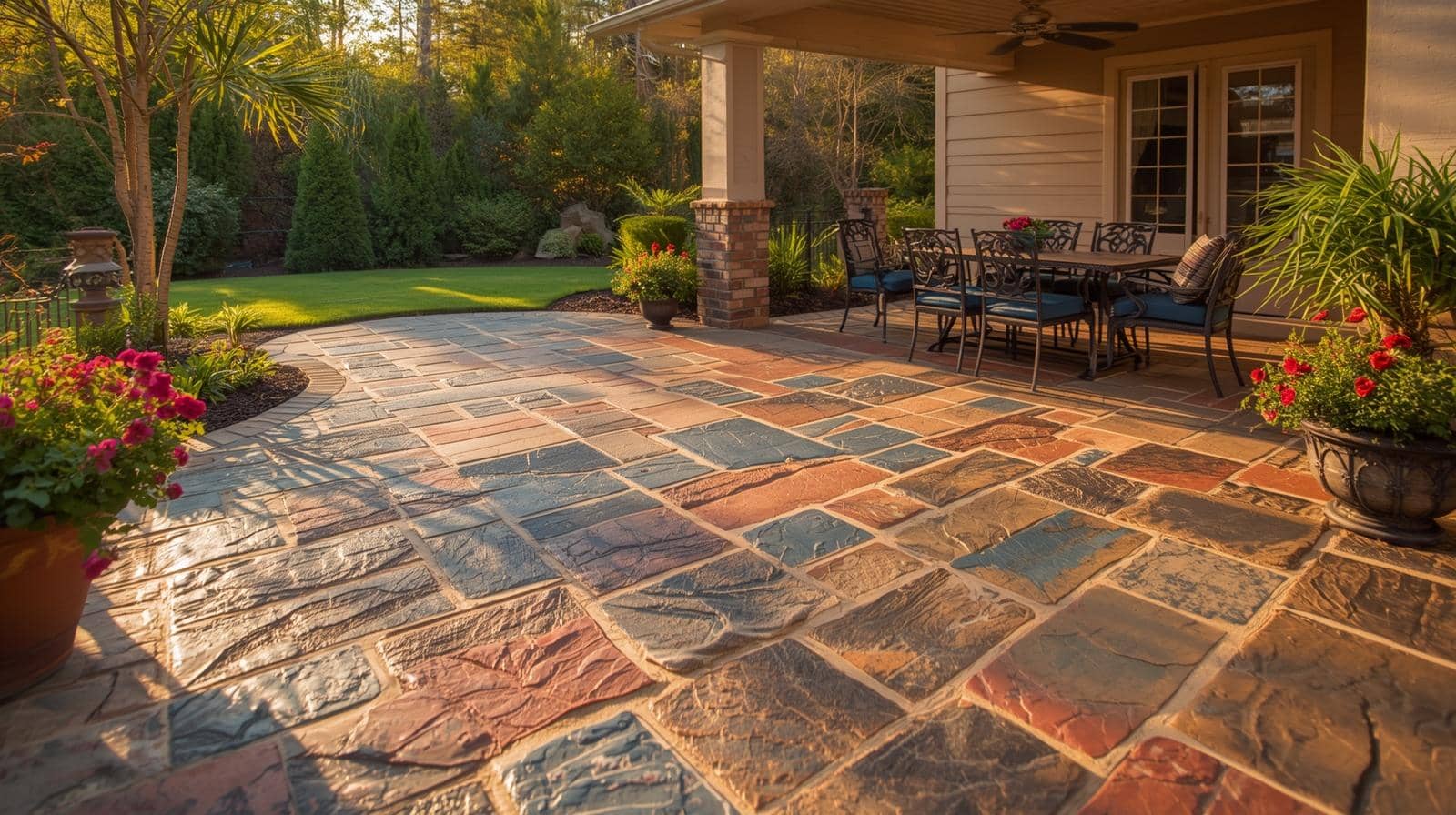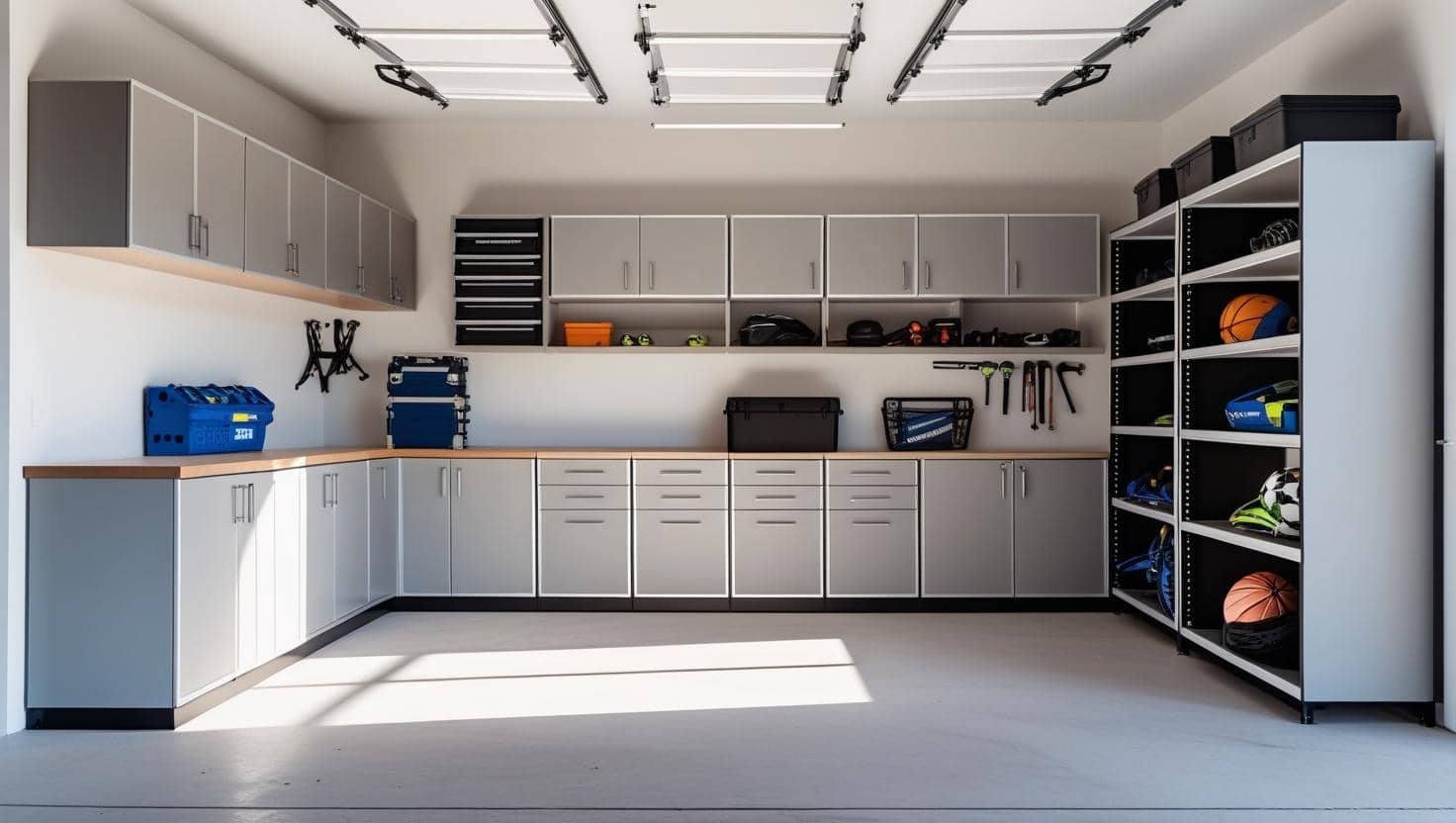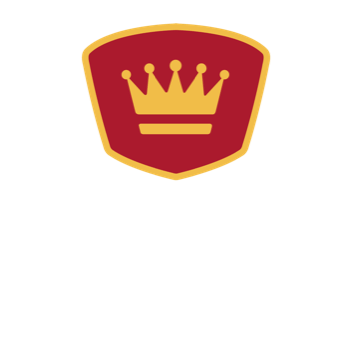Published by Garage Kings Delaware – Your Trusted Concrete Coating Specialists
Introduction
Your driveway, patio, and pool deck endure constant exposure to harsh weather conditions, heavy foot traffic, and chemical exposure. While quality concrete coatings are designed to last, they don’t last forever. Recognizing the warning signs that indicate it’s time for recoating can save you thousands in costly repairs and help maintain your property’s curb appeal and safety.
As Delaware’s premier concrete coating specialists, Garage Kings Delaware has helped hundreds of homeowners restore and protect their concrete surfaces. Through our extensive experience, we’ve identified five critical signs that indicate when your surfaces need professional attention.
Why Concrete Coating Maintenance Matters
Before diving into the warning signs, it’s essential to understand why timely recoating is crucial:
- Protection: Concrete coatings act as a barrier against moisture, chemicals, and UV damage
- Safety: Properly maintained coatings provide slip resistance and prevent trip hazards
- Cost savings: Preventive recoating costs significantly less than concrete replacement
- Property value: Well-maintained surfaces can increase property value by up to 10%
“The key to long-lasting concrete surfaces is proactive maintenance. Waiting until damage is severe often means the difference between a simple recoat and expensive concrete replacement.” – Mike Johnson, Garage Kings Delaware Operations Manager
Sign #1: Visible Wear Patterns and Traffic Marks
What to Look For:
The most obvious indicator that your driveway coating needs attention is the development of visible wear patterns. These typically appear as:
- High-traffic pathways: Dulled or worn areas where vehicles consistently travel
- Tire marks: Permanent black streaks that won’t wash away
- Foot traffic patterns: Worn paths leading to entryways or frequently used areas
- Hot tire pickup: Areas where the coating has been pulled up by hot tires
Why This Happens:
Concrete coatings experience gradual wear from:
- UV degradation: Sun exposure breaks down coating polymers over time
- Abrasion: Constant friction from tires, foot traffic, and dragged objects
- Chemical exposure: Oil, gasoline, and cleaning products can soften coatings
- Temperature fluctuations: Expansion and contraction cycles stress the coating
Professional Assessment:
Our team at Garage Kings Delaware uses a standardized wear assessment scale:
Wear Level | Description | Recommended Action |
Light (0-25%) | Minor dulling, no exposed concrete | Monitor, possible maintenance coat |
Moderate (25-50%) | Noticeable wear patterns, some thinning | Schedule recoating within 6 months |
Heavy (50-75%) | Significant wear, possible concrete exposure | Immediate recoating recommended |
Severe (75-100%) | Extensive coating failure, widespread exposure | Full coating system replacement |
Sign #2: Cracking, Chipping, or Peeling
Visual Indicators:
Structural damage to your coating system manifests in several ways:
- Spider web cracking: Fine, interconnected cracks that spread across the surface
- Edge peeling: Coating lifting at borders, expansion joints, or around drains
- Chip formation: Small pieces of coating breaking away, especially at impact points
- Delamination: Large sections of coating separating from the concrete substrate
Root Causes:
Understanding why these issues develop helps prevent future problems:
- Improper surface preparation: Inadequate concrete cleaning or etching during initial installation
- Moisture intrusion: Water penetrating beneath the coating through cracks or poor adhesion
- Substrate movement: Concrete settling, expansion, or contraction beyond coating flexibility
- Installation errors: Applying coating in poor weather conditions or incorrect thickness
Impact on Performance:
Once cracking or peeling begins, the damage accelerates rapidly:
- Water infiltration increases freeze-thaw damage
- Chemicals can directly attack the concrete substrate
- Trip hazards develop as coating edges lift
- Overall system integrity becomes compromised
According to the International Concrete Repair Institute, coating systems with more than 10% delamination should be completely removed and reapplied to ensure proper performance.
Sign #3: Color Fading and Loss of Gloss
Aesthetic Degradation Signs:
- Uniform fading: Overall color becomes lighter or shifts in hue
- Patchy discoloration: Uneven color distribution across the surface
- Chalk formation: White, powdery residue that rubs off when touched
- Loss of reflectivity: Surface appears flat and dull instead of glossy
The Science Behind Fading:
Color degradation occurs through several mechanisms:
UV Photodegradation: Ultraviolet radiation breaks down pigment molecules and polymer chains in the coating. Delaware’s climate exposes surfaces to approximately 1,400 hours of direct sunlight annually, accelerating this process.
Oxidation: Oxygen reacts with coating components, causing color shifts and surface deterioration.
Chemical Attack: Acid rain, pool chemicals, and cleaning products can alter pigmentation and surface chemistry.
Performance Implications:
While fading might seem purely cosmetic, it indicates deeper coating degradation:
- UV protection is compromised
- Chemical resistance decreases
- Surface porosity increases
- Water absorption rates rise
Color Retention Comparison:
Coating Type | Expected Color Retention | Typical Lifespan in Delaware |
Acrylic | 3-5 years | 5-7 years |
Polyurethane | 5-8 years | 8-12 years |
Polyaspartic | 8-12 years | 12-20 years |
Epoxy | 4-6 years | 6-10 years |
Data based on Garage Kings Delaware’s 15+ years of installation and maintenance records
Sign #4: Staining and Chemical Damage
Common Staining Issues:
Delaware homeowners frequently encounter these staining problems:
- Oil and grease stains: Dark spots that penetrate the coating surface
- Rust stains: Orange or brown discoloration from metal objects or water deposits
- Organic stains: Green or black marks from algae, mildew, or plant matter
- Chemical burns: Light spots where household chemicals have damaged the coating
Chemical Damage Assessment:
Different chemicals affect coatings in various ways:
Petroleum Products: Oil, gasoline, and automotive fluids can soften and dissolve certain coating types, creating permanent stains or soft spots.
De-icing Salts: Common in Delaware winters, road salt can cause coating delamination and concrete scaling beneath the coating.
Pool Chemicals: Chlorine and other sanitizers can bleach colors and break down coating polymers over time.
Household Cleaners: Acidic cleaners can etch coating surfaces, while alkaline cleaners may cause color changes.
Stain Penetration Test:
To determine if staining indicates coating failure:
- Clean the stained area thoroughly with appropriate cleaners
- If stains remain after aggressive cleaning, the coating has been compromised
- Water droplets that absorb quickly (within 30 seconds) indicate coating porosity
- Areas that cannot be restored to original appearance typically require recoating
Prevention Statistics:
Research by the Concrete Coatings Association shows that surfaces with compromised coatings absorb stains 300% faster than properly sealed surfaces.
Sign #5: Safety and Performance Issues
Critical Safety Concerns:
Safety should be your primary concern when evaluating coating condition:
Slip Resistance Loss: Worn coatings become smooth and dangerous, especially when wet. The Americans with Disabilities Act recommends slip resistance values above 0.6 for pedestrian surfaces.
Trip Hazards: Peeling or raised coating edges create uneven surfaces that can cause falls and injuries.
Chemical Exposure: Compromised coatings allow harmful substances to contact the concrete and potentially leach into groundwater.
Performance Degradation Indicators:
- Water absorption: Surfaces that don’t shed water properly indicate coating failure
- Temperature sensitivity: Coatings that become sticky in heat or brittle in cold
- Maintenance difficulty: Surfaces that require frequent cleaning or special care
- Structural concerns: Visible concrete damage beneath failing coatings
Delaware Climate Considerations:
Our Mid-Atlantic climate presents unique challenges:
- Freeze-thaw cycles: 25-40 cycles annually stress coating flexibility
- High humidity: 70%+ average humidity promotes mold and mildew growth
- Salt exposure: Coastal proximity increases corrosive salt exposure
- UV intensity: Summer UV index regularly exceeds 8 (very high category)
Safety Testing Methods:
Professional slip resistance testing uses several methods:
Test Method | Equipment Used | Industry Standard |
Pendulum Test | British Pendulum Tester | ASTM E303 |
Variable Angle | Brungraber Mark IIIB | ASTM F1679 |
Static Coefficient | Pull Meter | ANSI A137.1 |
When to Call Professionals vs. DIY Solutions
Professional Assessment Recommended When:
- Multiple warning signs are present
- Safety concerns exist
- Previous DIY attempts have failed
- Surface area exceeds 500 square feet
- Structural damage is visible
- Chemical contamination is suspected
DIY Maintenance Options:
For minor issues, homeowners can consider:
- Cleaning and degreasing: Regular maintenance cleaning with appropriate products
- Spot repairs: Small chip or crack repairs using manufacturer-approved materials
- Protective treatments: Application of topical sealers for minor protection enhancement
Professional Advantages:
Garage Kings Delaware’s professional approach includes:
- Advanced surface preparation: Diamond grinding, shot blasting, and chemical etching
- Material expertise: Selection of optimal coating systems for specific conditions
- Application technology: Professional spray equipment and environmental controls
- Quality assurance: Multi-layer systems with proper cure times and testing
- Warranty protection: Comprehensive coverage for materials and workmanship
Cost Analysis: Recoating vs. Replacement
Recoating Investment:
Professional driveway coating typically costs:
- Basic systems: $3-6 per square foot
- Premium systems: $6-12 per square foot
- Specialty systems: $12-20 per square foot
Replacement Costs:
Complete concrete replacement averages:
- Standard concrete: $8-15 per square foot
- Decorative concrete: $15-30 per square foot
- Total project costs: Often 3-5x higher than recoating
ROI Analysis:
Studies by the National Association of Home Builders indicate that driveway improvements provide an average return on investment of 75-85%, with well-maintained surfaces contributing to overall property appeal.
Long-term Value Comparison:
Maintenance Approach | 10-Year Cost | Surface Condition | Property Impact |
Reactive (crisis repairs) | $8,000-15,000 | Poor to Fair | Negative |
Proactive (scheduled recoating) | $4,000-8,000 | Good to Excellent | Positive |
Premium (high-end systems) | $6,000-12,000 | Excellent | Highly Positive |
Delaware-Specific Coating Considerations
Climate Adaptation:
Delaware’s unique climate requires specific coating characteristics:
Moisture Management: High humidity and frequent precipitation demand excellent moisture vapor transmission properties.
Temperature Flexibility: Coatings must remain flexible through temperature ranges from -10°F to 95°F.
UV Stability: Intense summer sun requires superior UV-resistant formulations.
Salt Resistance: Coastal proximity and winter de-icing require chemical-resistant systems.
Local Regulations:
Delaware environmental considerations:
- VOC (Volatile Organic Compound) restrictions limit certain coating types
- Stormwater management requirements affect drainage design
- Historic district guidelines may restrict color and finish options
- HOA regulations often specify acceptable coating types and colors
Seasonal Timing:
Optimal recoating windows in Delaware:
- Spring (April-May): Ideal temperature and humidity conditions
- Fall (September-October): Stable weather before winter preparation
- Summer considerations: High temperatures may require specialized products
- Winter limitations: Cold temperatures restrict most coating applications
Expert Recommendations from Garage Kings Delaware
Assessment Schedule:
Based on our experience, we recommend:
- Annual inspections: Visual assessment each spring
- Professional evaluation: Every 3-5 years or when concerns arise
- Immediate attention: Any safety issues or structural damage
- Preventive maintenance: Regular cleaning and minor repairs
Selection Criteria:
When choosing a coating system, consider:
Performance Requirements:
- Traffic levels (light residential to heavy commercial)
- Chemical exposure potential
- Aesthetic preferences
- Maintenance capabilities
Environmental Factors:
- Local climate conditions
- Substrate characteristics
- Application timing constraints
- Long-term performance expectations
Quality Indicators:
Signs of a professional installation:
- Proper surface preparation documentation
- Multi-coat system application
- Appropriate cure times between coats
- Quality control testing and inspection
- Comprehensive warranty coverage
Maintenance Best Practices
Daily Care:
- Sweep regularly to remove abrasive debris
- Clean spills immediately to prevent staining
- Avoid dragging heavy objects across the surface
- Use appropriate entrance mats to reduce tracked contaminants
Monthly Maintenance:
- Deep cleaning with pH-neutral cleaners
- Inspection for early damage signs
- Drain cleaning and water management
- Application of protective treatments as needed
Seasonal Preparation:
Spring: Assess winter damage, schedule repairs, deep clean surfaces Summer: Monitor for UV damage, maintain slip resistance, manage heat exposure Fall: Prepare for winter, clean and seal as needed, inspect drainage Winter: Minimize salt exposure, remove snow properly, avoid impact damage
Professional Maintenance Programs:
Garage Kings Delaware offers comprehensive maintenance plans including:
- Scheduled inspections and assessments
- Preventive treatments and minor repairs
- Priority scheduling for emergency issues
- Detailed documentation and reporting
- Extended warranty coverage
Conclusion
Recognizing these five critical signs—wear patterns, cracking and peeling, color fading, staining and chemical damage, and safety issues—enables proactive maintenance that protects your investment and ensures safety. Regular assessment and timely recoating significantly extend surface life while maintaining appearance and functionality.
Delaware’s challenging climate makes professional expertise particularly valuable. Environmental factors including humidity, temperature fluctuations, salt exposure, and UV intensity require specialized knowledge and appropriate material selection.
Next Steps:
If you’ve identified any of these warning signs on your driveway, patio, or pool deck:
- Document the issues with photos and notes
- Schedule a professional assessment with certified contractors
- Compare multiple quotes and warranty offerings
- Plan timing based on weather and usage requirements
- Invest in quality materials and professional installation
Contact Garage Kings Delaware
As Delaware’s trusted concrete coating specialists, Garage Kings Delaware combines decades of experience with cutting-edge materials and techniques. Our certified professionals provide comprehensive assessments, detailed quotes, and guaranteed results.
Services Include:
- Free on-site consultations and assessments
- Custom coating system design and selection
- Professional surface preparation and application
- Comprehensive warranties and maintenance programs
- Emergency repair services
Why Choose Garage Kings Delaware:
- 15+ years of Delaware market experience
- Certified installer network with ongoing training
- Premium materials from leading manufacturers
- Comprehensive insurance and bonding coverage
- Outstanding customer satisfaction ratings
Contact us today to schedule your free assessment and protect your concrete surfaces with professional-grade coating systems designed for Delaware’s unique climate challenges.
This article was prepared by Garage Kings Delaware’s technical team, drawing on 15+ years of concrete coating experience in Delaware’s unique climate. Information is based on industry standards, manufacturer specifications, and real-world performance data from thousands of local installations.
Sources and References:
- International Concrete Repair Institute (ICRI) Guidelines
- American Concrete Institute (ACI) Standards
- National Association of Home Builders Research
- Concrete Coatings Association Technical Data
- Delaware Department of Environmental Resources
- ASTM International Testing Standards


